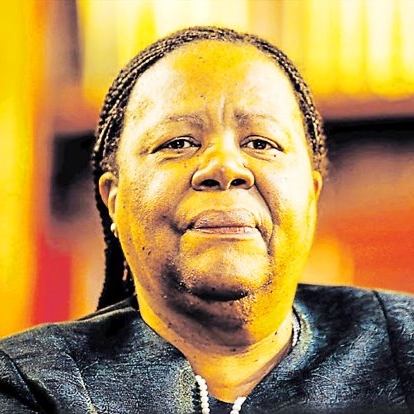
News

Naledi Pandor urges government to energise its pro-Palestinian battle
MOIRA SCHNEIDER
“We have been lacklustre in the past few years and we need to re-energise our activism in this regard,” she said.
“South Africans drew courage and support from the Palestinian people, even though they lacked freedom. We received support from the anti-apartheid movement and now that we’re enjoying our freedom, we mustn’t forget others.”
She claimed that the resolution to downgrade the South African embassy in Israel, adopted at the ANC’s elective conference in December, was “not an anti-Israel resolution but a pro-Palestinian resolution”.
“We committed to giving practical support to the oppressed people of Palestine.
“We are waiting for the ANC and the government to implement this decision.”
She would not speak about academic boycotts. “This must be decided by academics, not a minister of higher education.”
Pandor added that reform was “urgently” needed at the United Nations, particularly in terms of the powers and composition of the Security Council. “In the 21st century, it is not appropriate that just five countries [the permanent members of the Security Council] have the power to veto what is undemocratic and unjust. We do not have that veto power when we sit there.” South Africa has occupied a seat on the Council twice since 1994.
Pandor went on to express her “anger and dismay at Israel and its powerful friends in the north, at the absence of any attempt to free the people of Palestine from the oppression they suffer today”.
She claimed that the Palestinians’ education system was “deeply discriminatory”, with less funding and fewer teachers than in Israel. She said Palestinians were underrepresented at Israeli universities and other institutes of higher learning.
Referring to the “vast disparities” between black and white schooling under apartheid and the lack of access to education for many, Pandor said the people of Palestine faced similar challenges – “in many ways, worse”.
“They’re poorer than their Jewish neighbours and suffer discrimination, as we did under apartheid. Palestinians were promised a fifth of the land as part of [the] Oslo [Accords]. Today they control little more than a tenth.”
Pandor describes the current situation as a “catastrophe”. “To end 100 years of conflict, both sides need to really understand that neither can prevail through violence and oppression. The only solution is to share the land.
“Palestinians have endorsed the two-state solution for 30 years, but they are fearful that as time goes on, this becomes less and less likely,” she noted.
“To recognise the terrible plight of the people of Palestine is not sufficient. To organise ourselves to represent them and activating against Israel is also not sufficient. Up to now, our efforts have not led to freedom for the Palestinians.
What was needed was “an internal component, an international dimension, a sectoral dimension (academic boycotts) and seeking out those within the oppressive country who are supportive of change. Some in Israel are supportive – they need to be sought out and engaged. Our failure to make progress means we need to begin to identify powerful members of the global community” – to create an impetus towards the two-state solution.
“Perhaps as South Africans,” she continued, “we need to advocate that BRICS countries [comprising member states Brazil, Russia, India, China and South Africa] take on a stronger role in this regard. (China and Russia are permanent members of the Security Council).
“South Africa is chairing the BRICS Summit in 2018. We might want to demand that President Cyril Ramaphosa places this matter on the BRICS agenda.
Pandor suggested that the SA Students’ Congress (Sasco) and the PSF could take up the task of mobilising institutions of higher education globally. “They might begin a journey with smartphones and Internet that will be far easier than Oliver Tambo traipsing to Algeria [which had been a hub for Africa’s revolutionaries in their struggle for liberation].
“It is a challenge of such immense difficulty that it can’t be addressed by us as South Africans alone,” she stressed.
The first step, she suggested, was to write to Ramaphosa to ask what was happening with the resolution to downgrade the Israeli embassy, and to promote the idea of engaging with BRICS on the issue.





Anna
March 22, 2018 at 10:56 am
‘For a so-called "intelligent" minister, not a brain-cell in her head!’
Michael Rosenberg
March 22, 2018 at 2:48 pm
‘The South African Jewish voice is loud and can be heard world wide. Attacking South African Jewry is bad policy. But the powers that be want to rape South Africa without interference so they demonize Israel and ergo anyone supporting "Apartheid Israel" must be evil.’
nat cheiman
March 24, 2018 at 3:14 pm
‘Pandor thinks that there are no more important reasons and duties for ANC & government but to tackle the Palestinian problem.
With vacuous ministers like this in government, is it any wonder why SAA; Eskom;Sapo; Health Dept; Home affairs; Water and Sanitation; Education; 55 Municipalities are bankrupt;
A lack of ability and intellect is what afflicts SA’
Jessica
March 26, 2018 at 2:23 pm
‘Instead of spouting the most blatant BDS agitprop this leftie cadre should actually be working hard at cleansing our university campuses of their extremely toxic BDS nests.’